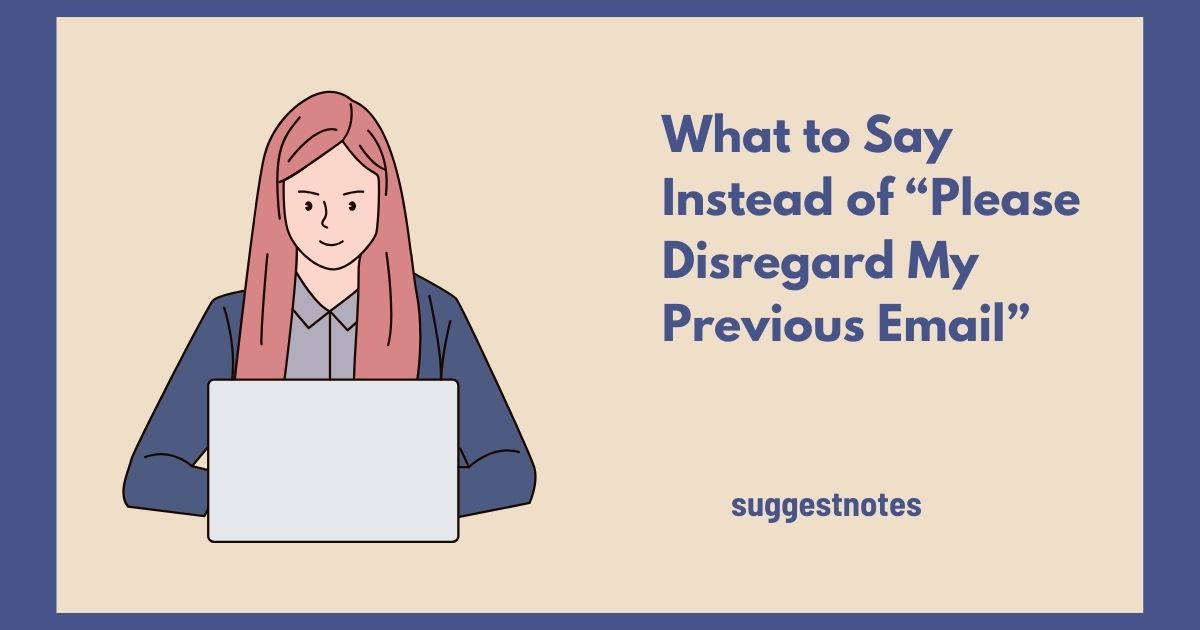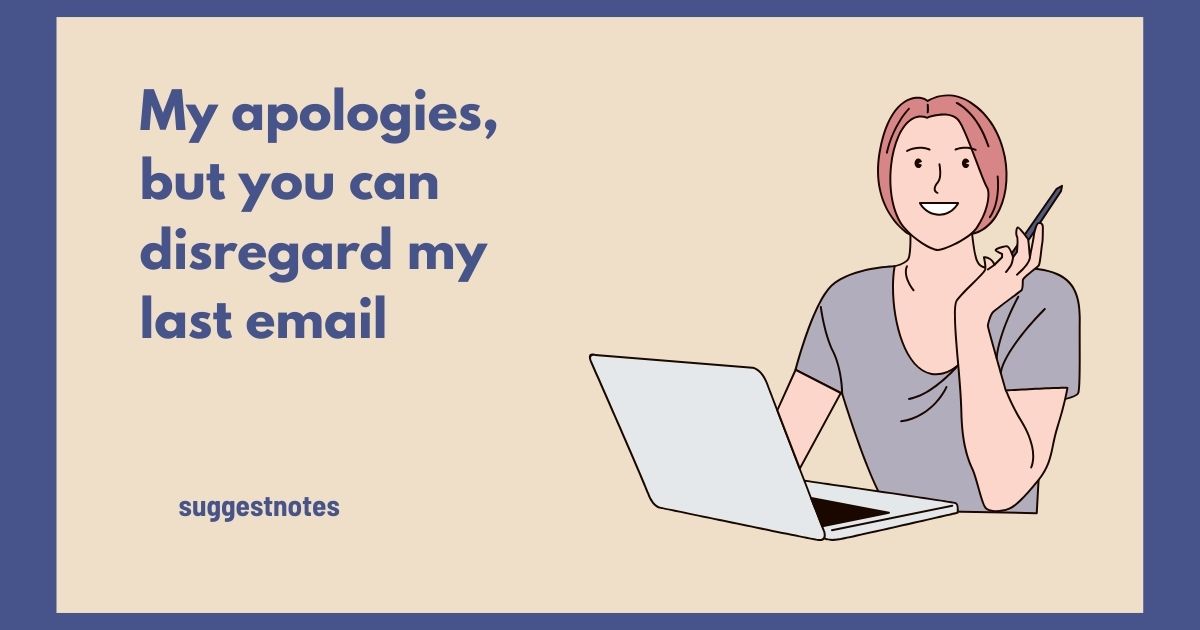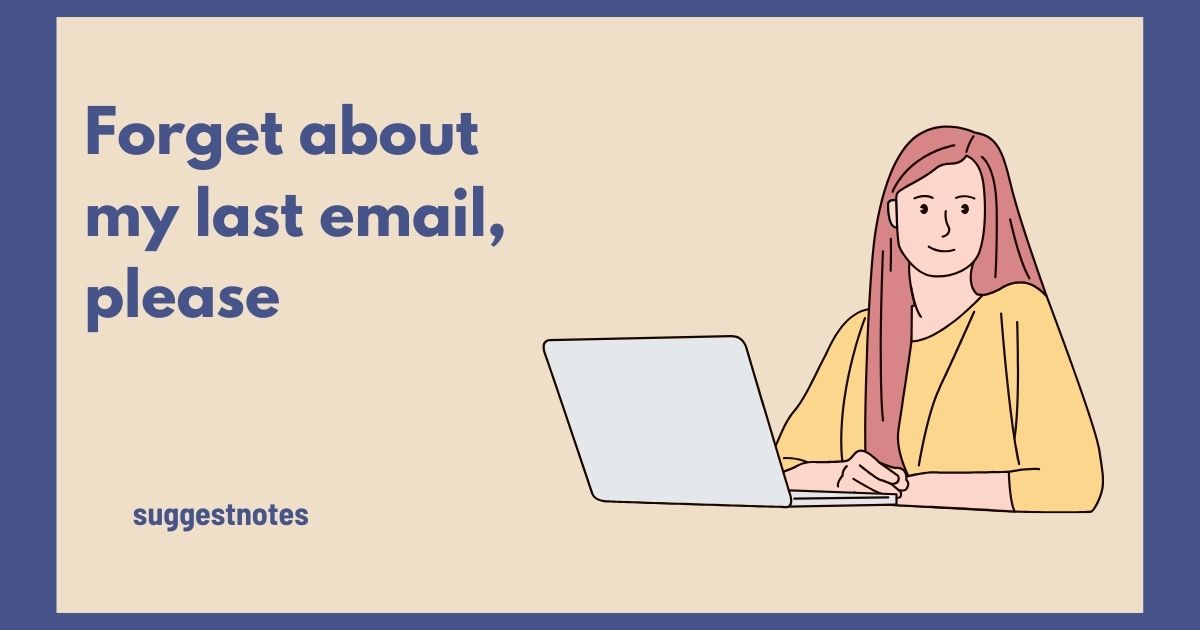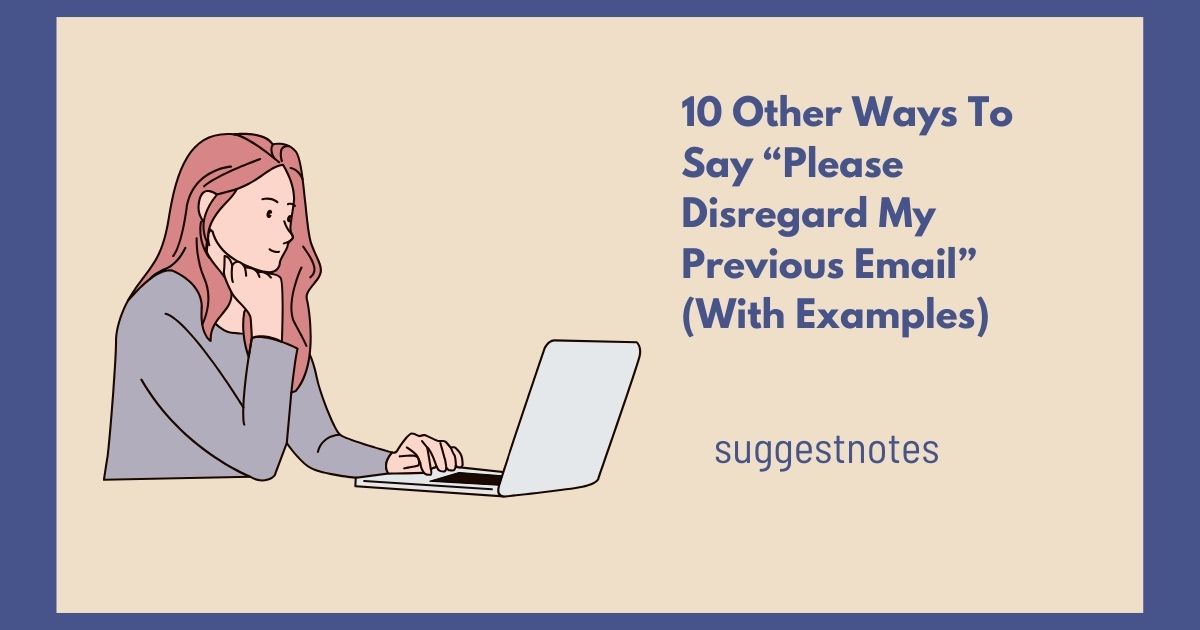It’s a sinking feeling we’ve all experienced. While the phrase “Please disregard my previous email” is a common fallback, it can sometimes come off as awkward or overly formal.
Whether you’re addressing minor typos or more significant blunders, these strategies will help you navigate the tricky waters of email etiquette with confidence.
In this blog post, I’ll share alternative phrases that allow you to gracefully acknowledge and correct email errors, helping you maintain professionalism while adding a bit of personality to your communication.
What to Say Instead of “Please Disregard My Previous Email”

Here are 10 alternative ways to say “Please disregard my previous email”:
- Kindly ignore my last message.
- Please consider my previous email null and void.
- My apologies, but you can disregard my last email.
- Please overlook my previous communication.
- Ignore my earlier email, please.
- My previous email is no longer relevant; please disregard it.
- Please disregard my last message and accept my apologies for any confusion.
- I retract my previous email; please disregard it.
- Forget about my last email, please.
- Please ignore my earlier message and accept my apologies for the oversight.
1. Kindly ignore my last message
“Kindly ignore my last message” is a polite and gentle way to ask someone to disregard a prior communication. This phrase is especially useful in professional emails where maintaining courtesy is crucial. It acknowledges that an error or change has occurred without placing blame or creating discomfort.
Usage examples:
- After realizing I sent out the wrong meeting agenda, I quickly followed up with, “Kindly ignore my last message; the updated agenda will be sent shortly.”
- “Kindly ignore my last message,” I wrote after accidentally forwarding incomplete information, ensuring clarity and professionalism.
2. Please consider my previous email null and void
“Please consider my previous email null and void” conveys a clear and formal request to disregard the earlier message. This phrase is particularly suitable in environments where precise language is valued, such as legal or corporate settings.
Usage examples:
- When I noticed a significant error in my initial report, I sent a correction with the note, “Please consider my previous email null and void.”
- “Please consider my previous email null and void,” I stated in a follow-up after earlier directives were superseded by new management decisions.
3. My apologies, but you can disregard my last email

“My apologies, but you can disregard my last email” combines an apology with a directive, making it clear that something in the previous communication was amiss. This expression is useful for acknowledging a mistake while instructing the recipient to ignore the erroneous message.
Usage examples:
- After sending outdated details to a client, I corrected myself by saying, “My apologies, but you can disregard my last email.”
- “My apologies, but you can disregard my last email,” I included in my follow-up to ensure no actions were taken based on incorrect scheduling information.
4. Please overlook my previous communication
“Please overlook my previous communication” is a formal way to ask someone to ignore a prior message. This phrase helps maintain a professional demeanor while acknowledging a mistake.
Usage examples:
- Realizing I had sent a premature announcement, I quickly wrote back, “Please overlook my previous communication; the official announcement will come later.”
- “Please overlook my previous communication,” I requested after detecting an error in the pricing details I had provided earlier.
5. Ignore my earlier email, please
“Ignore my earlier email, please” is a straightforward and casual request to disregard a previous email. This phrase works well when both parties are familiar with each other and prefer direct communication.
Usage examples:
- In a quick follow-up with a colleague, I mentioned, “Ignore my earlier email, please; I’ve found the information I was missing.”
- “Ignore my earlier email, please,” I noted after realizing I had sent a draft instead of the final document to my team.
6. My previous email is no longer relevant; please disregard it
“My previous email is no longer relevant; please disregard it” clearly communicates that the information provided previously has changed, rendering the initial email obsolete.
Usage examples:
- Following a change in the project timeline, I alerted the team, “My previous email is no longer relevant; please disregard it.”
- “My previous email is no longer relevant; please disregard it,” I explained to the department after a policy update that affected several procedures we had discussed earlier.
7. Please disregard my last message and accept my apologies for any confusion
“Please disregard my last message and accept my apologies for any confusion” instructs the recipient to ignore the previous email while offering an apology, enhancing the sincerity of the communication.
Usage examples:
- After incorrectly advising a deadline, I wrote, “Please disregard my last message and accept my apologies for any confusion; here are the correct dates.”
- “Please disregard my last message and accept my apologies for any confusion,” I said, following up on an email that mistakenly included a canceled meeting’s details.
8. I retract my previous email; please disregard it
“I retract my previous email; please disregard it” is a formal way to say that the sender takes back what was said in the earlier email.
Usage examples:
- Realizing I had sent confidential information to the wrong group, I promptly sent out another message saying, “I retract my previous email; please disregard it.”
- In a correction to an official communication error, “I retract my previous email; please disregard it” was necessary to ensure compliance with updated regulations.
9. Forget about my last email, please

“Forget about my last email, please” is an informal and direct way to ask someone to disregard a previous message, often used in casual professional relationships.
Usage examples:
- After a brief misunderstanding about the schedule, I clarified with, “Forget about my last email, please; I got the dates mixed up.”
- “Forget about my last email, please,” I quickly typed to a colleague after realizing I had forwarded incomplete information.
Related Guide:
10 Other Ways to Say “Happy to Hear That” (With Examples)
10. Please ignore my earlier message and accept my apologies for the oversight
“Please ignore my earlier message and accept my apologies for the oversight” combines a request to disregard the previous email with an apology for the mistake, smoothing over potential friction caused by the error.
Usage examples:
- “Please ignore my earlier message and accept my apologies for the oversight,” I wrote after accidentally sending a draft proposal instead of the final version.
- In a follow-up email correcting a financial miscalculation, I included, “Please ignore my earlier message and accept my apologies for the oversight.”
FAQ’s
What is the main topic of the article?
The article discusses 10 alternative phrases to say “Please disregard my previous email.” It provides examples and explains when to use each phrase, helping readers communicate more effectively in their email correspondence.
Why should I use different phrases instead of “Please disregard my previous email”?
Using different phrases can make your communication sound more natural and personable. It helps avoid repetition and keeps your emails engaging. Additionally, certain phrases can better fit the tone or context of your message, making your communication clearer and more effective.
Are the alternative phrases suitable for professional emails?
Many of the alternative phrases suggested in the article are suitable for professional communication. They maintain a courteous and respectful tone, which is important in business settings.
Can I use these phrases in informal emails?
Some of the phrases are more casual and work well in informal emails to friends or colleagues. The article highlights phrases that fit both formal and informal email contexts.
How can I choose the best phrase for my situation?
Consider the tone of your previous email and your relationship with the recipient. For formal situations, choose phrases that maintain professionalism. In casual contexts, you can opt for more relaxed phrases. The article provides context for each phrase to help you make the best choice.
Conclusion
Using varied phrases to address email mistakes can enhance your communication skills. Instead of defaulting to “Please disregard my previous email,” you can choose from many alternatives that add personality and warmth to your messages.
By practicing these email etiquette tips, you’ll improve your business correspondence and strengthen your workplace communication. Embrace these alternatives, and you’ll find that correcting mistakes becomes a more natural and positive experience.

As a content writer with five years of experience, I focus on creating insightful and impactful website content that drives engagement and boosts search visibility. With a strong foundation in SEO and digital marketing, I excel at crafting compelling narratives that resonate with audiences and enhance brand storytelling. My passion for data-driven content creation allows me to deliver pieces that not only inform but also inspire action. Whether through blog posts, web copy, or informative articles, I strive to empower businesses to connect authentically with their customers.







